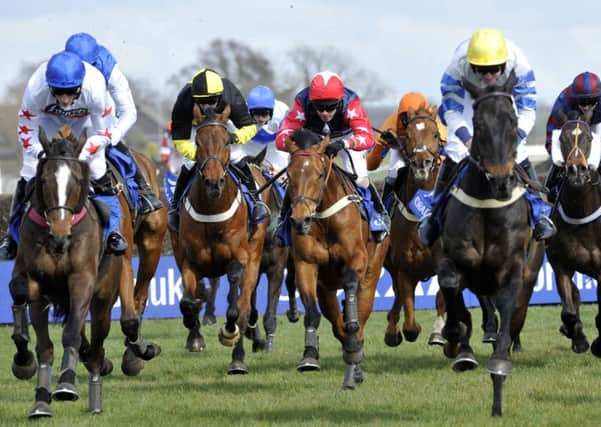Donald Morrison: Bookies are not all a-flutter about problem gambling – we’re on the case


Nowhere quite beats the buzz of the local bookie on a big race day. Betting shops around Scotland are gearing up for the Scottish Grand National in Ayr this month, one of the most popular events in the racing calendar.
They have also been busy preparing for a major regulatory change which will have significant long term implications for the industry and indeed for Scottish racing.
Advertisement
Hide AdAdvertisement
Hide AdFrom 1 April, new maximum stakes on gaming machines apply in betting shops, part of a drive by the UK government to reduce problem gambling.


The new regulatory environment will result in a smaller retail betting sector, with the closure of shops – and a knock-on effect on funding for racing – and the loss of retail jobs. The UK’s largest operators including Ladbrokes Coral, William Hill and BetFred have signalled their intention to close thousands of shops. Some independents have already gone under and more are at risk. The industry in five years time will be much leaner.
But what won’t diminish is our commitment to responsible gambling. Betting shops take their responsibility to their customers seriously and will continue to remain at the forefront of industry efforts to reduce problem gambling. All of the safeguards currently in place in betting shops will remain, including the ability to set time and spend limits so that customers can stay in control of their spending, and a longstanding ban on advertising gaming machines in shop windows.
Our trained staff will continue to have access to world leading technology that allows them to monitor player behaviour. A UK-wide multi-operator self exclusion scheme, piloted in Glasgow, will continue as normal.
Our members have also recently agreed to introduce a ‘whistle to whistle’ ban on gambling adverts during live football. These changes, which will effectively stop betting adverts from being shown in commercial breaks during televised live sport, highlight shows and reruns, will be introduced in the summer.
These measures complement additional restrictions that have been made by some broadcasters, which include limiting betting adverts during the ‘build up’ shows prior to live sport to one advert per break.
We’re committed to making life better for our customers and communities. That is why we will continue to support responsible gambling campaigns and provide funding for charities engaged in education, research and treatment of problem gambling.
This year, for example, Ladbrokes Coral has doubled its investment in responsible gambling initiatives, committing more than £4 million in 2019, twice the contribution called for by the sector’s responsible gambling organisations. William Hill has also stepped up its support in this area, launching its Nobody Harmed initiative to help identify people at risk and support those who experience harm.
Advertisement
Hide AdAdvertisement
Hide AdAt the same time, our members continue to work with charities like Prostate Cancer UK and White Ribbon Scotland to raise awareness about health and welfare issues through our shops. Our campaign activity with both charities has been recognised in this year’s Business Charity Awards, underlining the important role that betting shops play as community hubs.
At Westminster, MPs have recently been debating the need for more funding support for problem gamblers through the NHS. Currently, the UK has only one NHS-funded facility, National Problem Gambling, in London. In January, the UK government announced its intention to fund more dedicated problem gambling clinics, with Leeds mooted as a possible venue.
In Scotland, funding for such a clinic is the devolved responsibility of the Scottish Government. We back the growing number of MPs, like Ronnie Cowan, who have called for a similar clinic in Scotland and we would encourage the Scottish Government to work with GambleAware to bring forward investment as a top priority.
Gambling is a leisure activity enjoyed by millions of people every year. In Scotland, around two-thirds of us gamble from time to time and the vast majority do so for fun. Latest figures from the Gambling Commission show that levels of problem gambling remain relatively low at 0.8 per cent.
However, we recognise our responsibility to protect customers from harm and we know we must step up our efforts to tackle problem gambling. We want everyone who visits our shops to have an enjoyable and safe experience.
That is why betting shops will continue to lead the way in tackling problem gambling. You can bet on it.
Donald Morrison, Scottish media and public affairs, ABB Scotland.